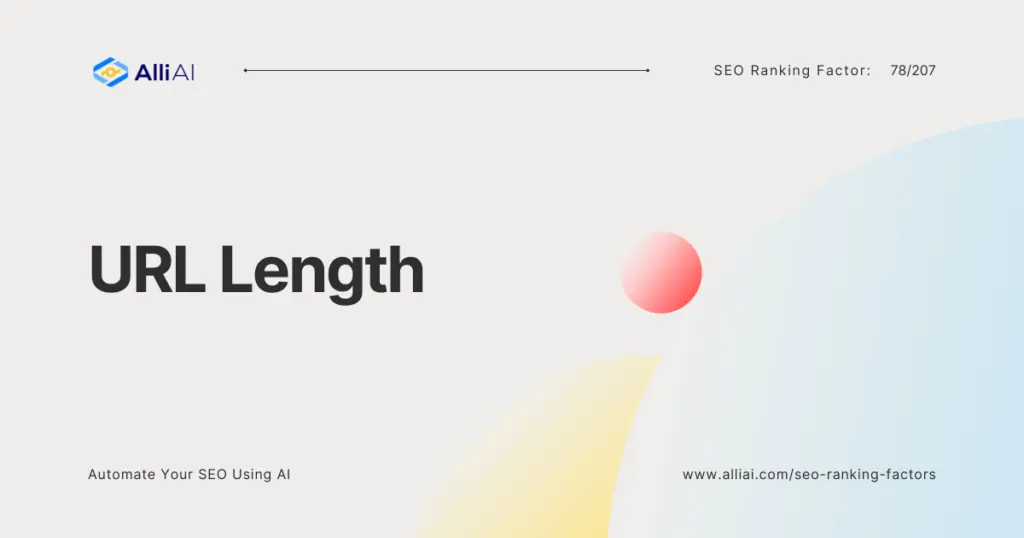What is URL Length?
URL length refers to the number of characters in a webpage’s URL. It includes everything from the protocol (http or https) to the domain name, path, and any parameters or tracking codes attached to the end.
Consider a URL as the address to a location. Just as a longer address can be more difficult to remember and more prone to errors when being shared, a longer URL can be less user-friendly and harder for search engines to process.
URL Anatomy: Understanding the Components
A Uniform Resource Locator (URL) is essentially the address of a webpage. It consists of several components:
- Protocol: Indicates how a browser should communicate with the server (e.g., HTTP or HTTPS).
- Domain Name: The website’s unique name (e.g., www.example.com).
- Path: Identifies the specific page or resource within the website (e.g., /blog/article-title).
- Query Parameters: Optional elements used to pass information to the server (e.g., ?utm_source=newsletter).
How URL Length Affects SEO
User Experience: Shorter, descriptive URLs are inherently more user-friendly. They are easier to read, remember, and share on social media or via email. This improved user experience can lead to higher click-through rates from SERPs.
Crawlability and Indexability: Search engine crawlers have limitations on the length of URLs they can process. Excessively long URLs may not be fully crawled or indexed, potentially impacting the visibility of the corresponding pages.
Keyword Relevance: URLs are a valuable on-page SEO element. Incorporating relevant keywords into the URL can signal to search engines the topic of the page, potentially improving its ranking for those keywords. However, keyword stuffing should be avoided.
Click-Through Rate (CTR): Lengthy, complex URLs can deter users from clicking on them in search results. Studies have shown a correlation between shorter URLs and higher CTRs.
Best Practices for URL Length
While there’s no definitive “magic number” for ideal URL length, several guidelines can help you optimize:
- Keep it Under 60 Characters: Backlinko’s research suggests that URLs under 60 characters tend to perform better in SERPs.
- Prioritize Readability: Aim for URLs that are concise, descriptive, and easy to understand for both users and search engines.
- Use Hyphens to Separate Words: Hyphens are the preferred separator in URLs, as they are recognized by search engines as word breaks.
- Avoid Unnecessary Parameters: Minimize the use of query parameters, especially dynamic ones that can create excessively long URLs.
Technical Considerations for URL Length
- Canonicalization: Implement canonical tags to consolidate duplicate content and prevent issues arising from variations in URL parameters.
- 301 Redirects: When changing URLs, use 301 redirects to preserve link equity and avoid broken links.
- URL Shorteners: Use URL shorteners with caution, as their overuse can be perceived as spammy by search engines.
How Alli AI can help?
Comprehensive URL Analysis: Alli AI’s advanced algorithms meticulously analyze your website’s URLs, assessing their length, structure, and adherence to SEO best practices. This thorough examination pinpoints any excessively long or complex URLs that might be hindering your website’s performance.
Actionable Recommendations: Based on the analysis, Alli AI provides tailored suggestions for improving your URLs. This includes recommendations for shortening URLs, incorporating relevant keywords, and removing unnecessary parameters.
Streamlined Implementation: Alli AI doesn’t just identify issues; it also guides you through the implementation of solutions. The platform provides step-by-step instructions on how to shorten URLs, set up redirects, and manage canonical tags, ensuring a seamless transition to optimized URLs.
Continuous Monitoring: SEO is an ongoing process, and URLs can change over time. Alli AI continuously monitors your URLs, alerting you to any new issues that may arise, such as broken links or redirect errors. This proactive approach ensures that your URLs remain optimized for both search engines and users.
FAQ
How Long Should My URLs Be for Optimal SEO?
For optimal SEO, aim for URLs that are under 60-70 characters. This length is manageable for users to read and share, and it’s concise enough for search engines to parse effectively.
Does Every Character in a URL Count the Same?
Yes, every character in a URL counts, including the protocol, slashes, and parameters. It’s crucial to keep the entire URL as concise as possible while ensuring it remains descriptive and relevant to the page content.
Can Changing My URL Structure Impact My SEO?
Yes, changing the URL structure can significantly impact SEO, particularly if not handled correctly. It’s essential to implement proper redirects (301 redirects are recommended) when changing a URL to prevent losing any existing search engine rankings.
Conclusion
In the complex ecosystem of SEO, URL length emerges as an essential yet often neglected factor that can significantly influence a website’s search engine ranking and user experience. Keeping URLs short, descriptive, and free of unnecessary parameters can enhance their effectiveness in both search engine crawling and user engagement.
By understanding and implementing best practices for URL structure, including optimal length, websites can improve their SEO performance, driving more traffic, and achieving better search rankings. Remember, in the world of URLs, shorter often means stronger.






